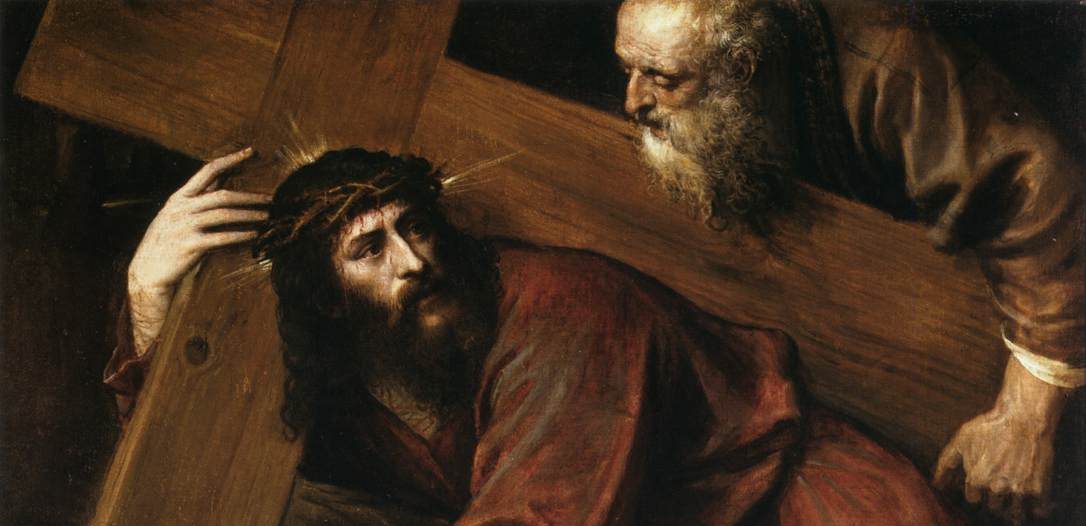
For we do not have a high priest who is unable to sympathize with us in our weaknesses, but one who has been tested in every way as we are, yet without sin (Heb 4:15).
Those words have perhaps never meant as much to me as they do this Holy Week…
this Holy Week, when I see you in my heart, but cannot see you in the flesh, when Christians all over the world cannot be together on this week of weeks;
this Holy Week, when I saw a nurse in England in her car, before work, begging people to stay home. She was in tears, and she said, “We’re doing everything we can. I know we’re doing everything we can, but it’s not enough. People are dying…I’m sinking a bit. Some of us are sinking a bit.”
This Good Friday Jesus comes to us, our crucified Lord, and his word is hope.
Even though it is a day of such sorrow, even though he is crucified, even though we shout, “Crucify Him!”, his word is a word of hope.
It is a word of hope because he has been here too. He knows this nurse’s tears. He has cried out in tears, too. Hebrews tells us that. He has cried out in tears with prayers and supplications to the one who is able to save him from death. He has cried out like this nurse in the face of death.
Our God is not distant, some impassible power. He is a man who weeps with us.
Pilate says it, even though he does not know what he is saying.
Then Jesus came out, wearing the crown of thorns and the purple robe. And Pilate said to them, “Here is the man.”
Here is the man. He is a human being like us.
There he stands with a weight of suffering on his head, and his hands are bound. His hands are bound as we are bound. Do we not know, this week, how we are bound! Bound by illness; half a world shut down by this virus we cannot even see, bound by fear in the face of illness, bound by death.
We are bound. And here is Jesus on this day – on this very day – bound with us.
And there is more. This virus is a kind of parable. It speaks to another weakness, another disease, a deeper binding.
For if Jesus is bound like we are – if we have a high priest who can sympathize with us on this day – it is also we who have bound him.
“Here is the man,” Pilate says.
And the people shout, “Crucify him!”
We the people. It is our cry. We have spoken it today, just now, in the Passion Narrative. We have spoken it on many another day, too.
“Shall I crucify your king?” Pilate says.
“We have no king but Caesar,” the people reply.
It’s a funny thing. The Lord whom we seek comes to his temple. Here he is, on this day, standing before us. And we are not interested. More than that: we are actively hostile.
This too is the truth about this day, the truth about who we are.
Packs of dogs close me in;
Gangs of evildoers circle round me.
They pierce my hands and my feet;
I can count all my bones. (Psalm 22)
We are the ones who pierce him. We choose to be free, to have no Lord: “we have no king but Caesar.” And this is the greater binding.
Because God is the one who loves us and made us for himself. Our hearts, as Augustine knew long ago, our hearts are restless till they find their rest in him. Our hearts long for this man we have crowned with thorns.
Why do we do it? Ask yourself that every time you hurt the person you love. Is there an answer? Ecce homo. Here is the human being. Jesus’ bound hands are a parable for our binding, for the smallness of our hearts, the dryness of our hearts turned away from God.
We can look only glancingly at Good Friday. It is too hard to see.
But this too, this grief too, Jesus helps.
Because today when we look at who we are – packs of dogs close me in; they pierce my hands and my feet – when we see who we are in the thorns around Jesus’ head and in his bound hands, we see too, at the same time, his face. We see his beloved face.
We cannot see who we are, anymore, without seeing also his beloved face.
He has taken us to himself. Just as we are. Our thorns on his brow.
He has taken the evil that we do and he has borne it upon his own head. And there he has given it back to us as grace.
He has given us back to ourselves.
Ecce homo! Look – here is the human being. Here, now, in his face. Here we are, in his gracious and suffering face.
AMEN.

[…] Read sermon text here […]